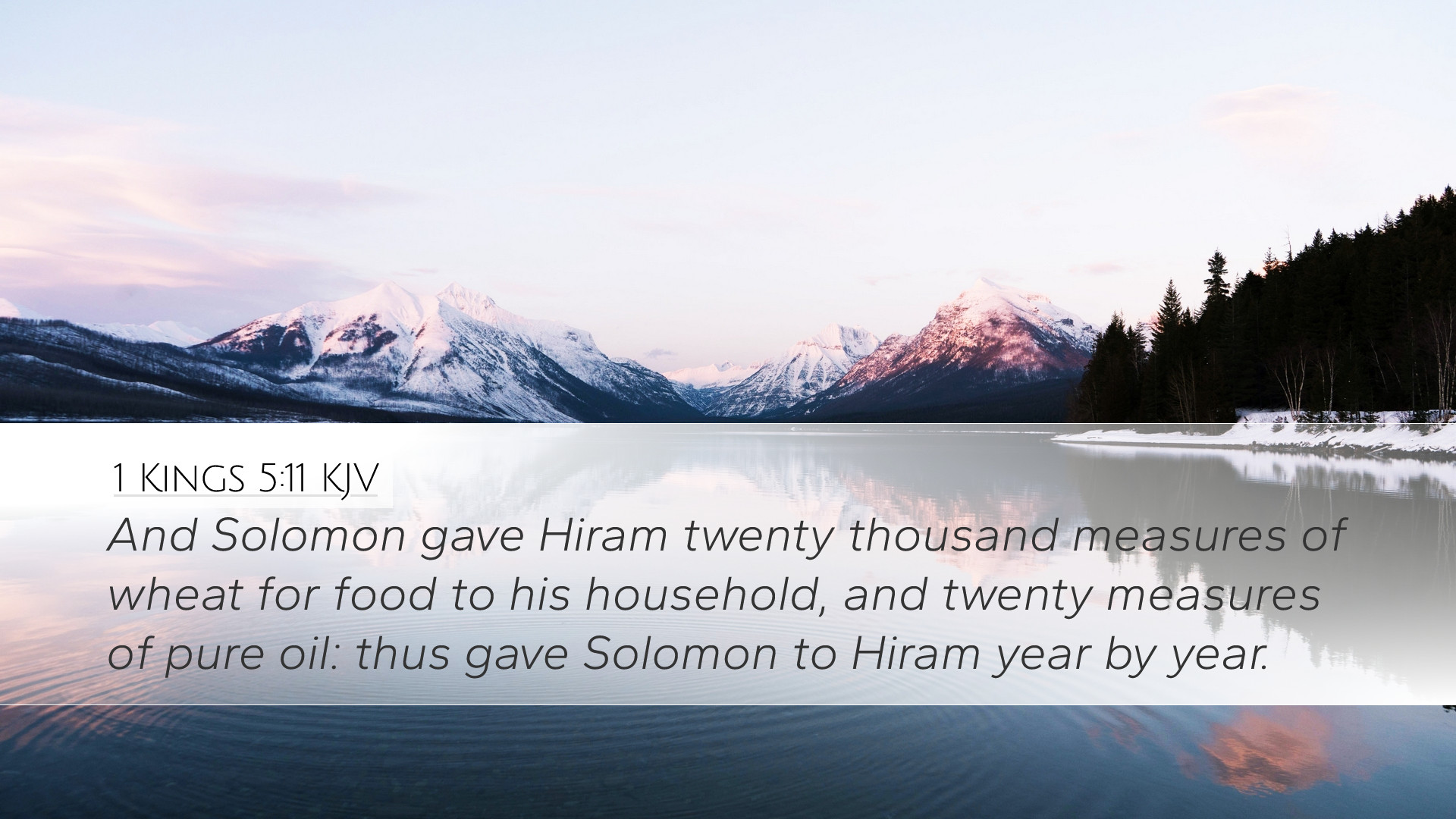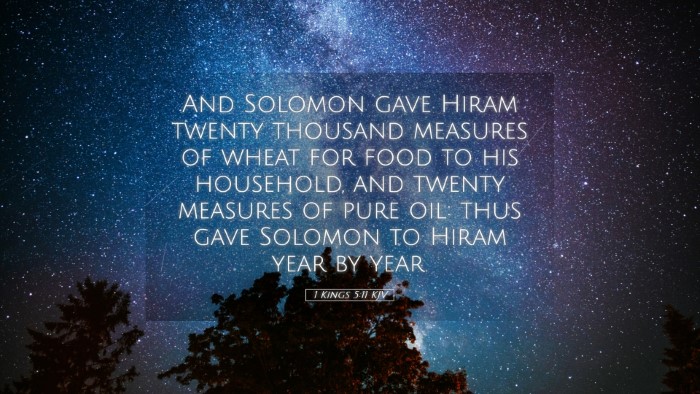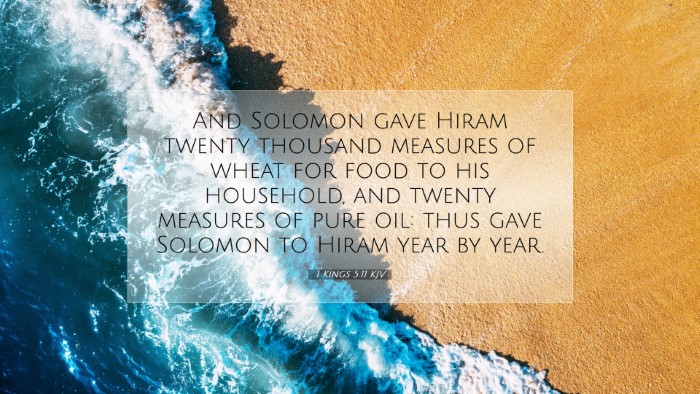Old Testament
Genesis Exodus Leviticus Numbers Deuteronomy Joshua Judges Ruth 1 Samuel 2 Samuel 1 Kings 2 Kings 1 Chronicles 2 Chronicles Ezra Nehemiah Esther Job Psalms Proverbs Ecclesiastes Song of Solomon Isaiah Jeremiah Lamentations Ezekiel Daniel Hosea Joel Amos Obadiah Jonah Micah Nahum Habakkuk Zephaniah Haggai Zechariah Malachi1 Kings 5:11
1 Kings 5:11 KJV
And Solomon gave Hiram twenty thousand measures of wheat for food to his household, and twenty measures of pure oil: thus gave Solomon to Hiram year by year.
1 Kings 5:11 Bible Commentary
Commentary on 1 Kings 5:11
Verse Context: 1 Kings 5:11 states, "And Solomon gave Hiram twenty thousand measures of wheat for food to his household, and twenty measures of pure oil: thus gave Solomon to Hiram year by year." This verse is significant as it marks the beginning of a fruitful alliance between King Solomon of Israel and Hiram, the king of Tyre, a relationship that would greatly impact the construction of the Temple in Jerusalem.
Historical Context
The partnership between Solomon and Hiram illustrates the political and economic strategies of ancient kingdoms. Hiram, known for his skilled craftsmen and availability of quality cedar wood, played a crucial role in Solomon's ambitious building projects.
Matthew Henry’s Commentary Insights
- Provision for Hiram: Henry emphasizes the importance of Solomon’s provision for Hiram's household. The wheat and oil symbolize not just sustenance but the forming of a diplomatic relationship where both leaders benefitted.
- Symbolism of Wheat and Oil: The offer of wheat and oil signifies abundance and favor, with oil representing the sacred and a necessity for anointing and offerings.
- Regular Payment: The repeated annual payments highlight a stable relationship and Solomon’s intent to honor his commitments as a king, ensuring the continuity of this alliance for mutual benefit.
Albert Barnes’ Commentary Insights
- Civic Exchange: Barnes notes this verse illustrates the economic exchange necessary for effective governance. Solomon’s payments to Hiram were essential not just for material support but establishing bonds of loyalty and friendship.
- Wisdom in Alliances: He points out that Solomon wisely seeks to strengthen relationships with neighboring kings, which would provide not only resources, but also political stability against external threats.
- The Importance of Hiram: Acknowledging Hiram's expertise in craftsmanship, Barnes highlights that this partnership produced materials crucial for the Temple, thus emphasizing the divine wisdom in Solomon’s choices.
Adam Clarke’s Commentary Insights
- Specifics of Payment: Clarke describes the exact measures of wheat and oil as a reflection of Solomon’s wealth and his organized governmental structure that could manage such supplies.
- Tradition of Tribute: He notes that the tribute paid to Hiram was typical of the custom in that era for maintaining strong diplomatic relations amongst nations.
- Spiritual Dimensions: Clarke also adds a spiritual dimension, suggesting that such acts of generosity are reflective of a leader's heart towards God and the fulfillment of His promises by providing for others.
Theological Implications
The alliance between Solomon and Hiram serves to illustrate the biblical principle of community and cooperation. Just as Solomon depended on Hiram for resources necessary for the work of God in building the temple, modern-day believers are reminded of their need for one another in the body of Christ, utilizing each individual’s gifts and resources for a greater purpose.
Lessons for Pastors and Leaders
- Building Cooperation: Leaders are encouraged to foster partnerships that can enhance ministry effectiveness. The concept of strategic alliances in pastoral leadership finds important precedence in this scriptural account.
- Commitment to Service: The recurring provision signifies commitment. Pastors must commit to serving their congregations and communities in tangible ways, mirroring Solomon's relationship with Hiram.
- Utilizing Resources Wisely: The healthy use of finances, skills, and resources in ministry is a reflection of godly stewardship. It draws a parallel to the notion of supporting church growth through communal responsibility.
Conclusion
1 Kings 5:11, while a straightforward account of Solomon's provision to Hiram, is a profound reflection on the nature of leadership, the importance of alliances, and the effective use of resources in fulfilling God’s purposes. By examining the insights from Henry, Barnes, and Clarke, we are reminded that thoughtful and strategic partnerships can lead to significant advancements, particularly in the context of ministry and spiritual endeavors. The legacy of Solomon’s temple, built on such alliances, calls today’s leaders to act with wisdom, generosity, and an understanding of their role within God’s greater narrative.


